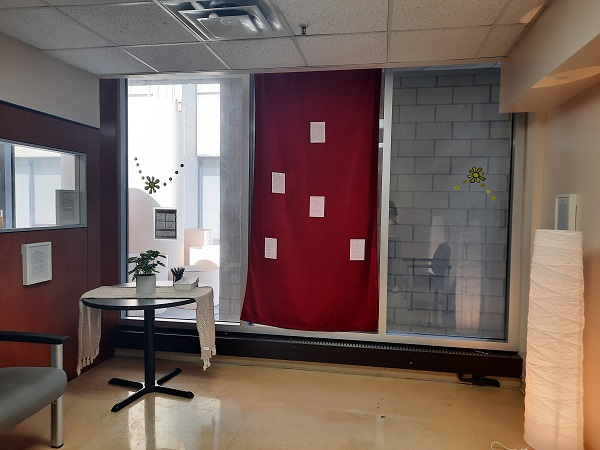By Justine Giosa, Hana Irving, Neeliya Paripooranam, Celina Carter
Hospitals are complex ecosystems of people — patients, families, caregivers, staff, physicians, and volunteers — all experiencing a range of emotions and witnessing those of others: joy, sadness, relief, fear, grief. The fast-paced nature of work and care can make it challenging to find time to pause, reflect, connect and process, especially since the pandemic.
Dr. Paula Chidwick, William Osler Hospital System’s (Osler) Director of Ethics and Spiritual Care, believes that finding innovative ways to support the mental health and well-being of patients, families, caregivers, staff, physicians, and volunteers across the continuum of care is critical to building a more resilient health care system. She has been a key supporter of bringing the Reflection Room project to Osler’s Brampton Civic Hospital, Peel Memorial Centre for Integrated Health and Wellness and Etobicoke General Hospital sites. The Reflection Rooms opened on September 6 and everyone who is being cared for, visiting or working in the hospital is welcome to visit and reflect.
The Reflection Room project is led by the SE Research Centre as part of SE Health’s commitment, as a social enterprise, to action-oriented research. Reflection Rooms are evidence-based, participatory art installations that offer an immersive physical space for people to write stories about their experiences and read the stories shared by others.
In a research study from 2016-2020, 62 Reflection Rooms were installed across Canada, with over a thousand visitors’ reflections collected and uploaded to www.thereflectionroom.ca. The study confirmed that storytelling can be an important part of witnessing loss and processing emotions such as grief, and that Reflection Rooms create space for remembering, celebrating, teaching, learning, and connecting. “Part of the success of the project,” said Dr. Paul Holyoke, SE Research Centre Executive Director and study co-principal investigator, “is that it is rooted in evidence, which allows the Reflection Room to adapt, grow and expand to fit needs, spaces and contexts.”
During the pandemic, the Reflection Room project evolved to address pandemic-related grief and loss in residential long-term care (LTC) homes. Supported by the Saint Elizabeth Foundation and others, Reflection Rooms have been installed in a variety of LTC homes across Ontario.
Emerging research findings suggest that the Reflection Rooms helped LTC residents, caregivers, and staff to look inwards in a helpful way, find moments of calm and peace, and feel a sense of connection and compassion. Feedback from LTC home administrators indicates that a Reflection Room is a good support for those who are grieving and it has the potential to aid holistic well-being for individuals and communities. These findings affirm key principles of resiliency: maximizing social cohesion, collaboration, empowerment, participation, and consideration of local characteristics and issues.
Karen Sedore, Director of Organizational Development at Osler, believes the Reflection Room project aligns with Osler’s other Healthy Workplace initiatives. “At Osler, we have prioritized our commitment to supporting the health and wellness of our Osler team members,” she said. “To do so, we’ve enhanced programming focused on both the physical and emotional well-being of our entire Osler team. Among our many initiatives, the Reflection Room project provides another opportunity to further focus on hope, resiliency, and personal welfare.”
The Reflection Room project is not designed to take away emotional pain. Instead, it offers patients, families, caregivers, staff, physicians, and volunteers an opportunity to slow down and start – or continue – to work through the feelings that they carry. The Reflection Rooms can be explored and used by everyone in any way they see fit – to write and read reflections, pray, or simply have a quiet moment away from hustle and bustle.
Augustus Oku, Spiritual Care Coordinator at Osler, believes in the power of storytelling to support one another during difficult times. “For me, the Reflection Room is a spiritual environment that may help us understand that we can only heal and grow when we take some time to reflect about our challenges,” he said.
For information about the Reflection Room project, contact research@sehc.com.
Justine Giosa, Hana Irving, Neeliya Paripooranam and Celina Carter work for the SE Research Centre & Saint Elizabeth Foundation.




